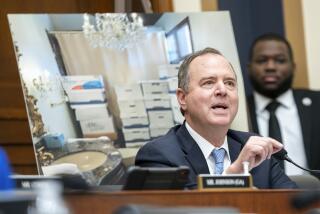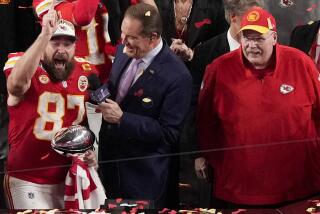Reid, an ex-boxer, hasn’t forgotten Bush’s punches
- Share via
In the coming months, it will probably be useful to remember that as a young man, Sen. Harry Reid (D-Nev.) spent some time as an amateur middleweight boxer. Reid understands one reason his job title is changing from leader of the
Democratic minority to Senate majority leader is that many voters recoiled against the unrelenting combat between the parties that has characterized George W. Bush’s presidency.
But it’s also apparent that Reid has not forgotten the punches thrown by the White House and GOP congressional leaders over the last six years, and that he considers more than a few of them low blows.
President Bush, at his morning-after-the-deluge news conference Wednesday, grandly declared inoperative his slashing campaign-trail claim that the Democratic agenda on national security and Iraq could be reduced to a single equation: “The terrorists win and America loses.”
Reid talks about turning the other cheek, but he also seems to remember exactly where that blow landed and how much it stung. “Some of the things that have been said by [Vice President Dick] Cheney and [the president] are hard to comprehend,” Reid told a small group of reporters late last week.
It was only a single jab from Reid, tight and targeted, but it was also a signal of how much Bush’s life will change during the next two years. Notwithstanding occasional dissent, the GOP Congress saw itself as a supporting member of the White House team, almost as if both were part of a parliamentary system. In that role, Capitol Hill Republicans allowed Bush to set the national agenda and minimized congressional oversight that might have embarrassed the administration.
With Reid and incoming House Speaker Nancy Pelosi of San Francisco, Bush will face two pugnacious Democrats determined to challenge his agenda and to force him to react to their own goals. Bush could count on congressional Republicans to repeatedly schedule votes on his priorities, such as legislation to abolish the estate tax. Reid dismisses that idea with barely a shrug. “We wasted so much time on it,” he says. Is Bush’s goal of eliminating the estate tax dead? “It better be,” he says.
Instead, Democrats want to force the national debate onto a very different agenda. Reid says he expects the Senate “pretty quickly” to pass legislation raising the minimum wage. He’s also optimistic about quick action allowing Medicare to negotiate directly with drug companies for lower prescription prices -- an idea the White House and the pharmaceutical industry blocked in 2003 when Congress passed the drug benefit for seniors.
Reid anticipates more aggressive congressional oversight, starting with Iraq. Outgoing Senate Intelligence Committee Chairman Pat Roberts (R-Kan.), a close White House ally, slow-walked a promised investigation into whether intelligence data supported the administration’s prewar public claims about Iraqi weapons of mass destruction. Roberts also structured the inquiry in ways that constrained the danger to Bush; most important, the committee did not compel senior administration officials to answer questions under oath.
Now Reid expects John D. Rockefeller IV (D-W.Va.), who will head the Senate Intelligence Committee, to briskly conclude a comprehensive study. “I think not only as part of good government, but as part of history, that investigation should be completed,” he says.
The biggest question facing the incoming Democratic majorities in both chambers is how hard to push Bush on Iraq. Almost all Democrats are comfortable with examining the administration’s performance through tough oversight and exhorting Bush to change course.
Reid, for one, has a crisp set of preferences on Iraq. He wants Bush to personally convene a regional conference with Egypt, Saudi Arabia, Jordan and Syria (the latter has been on the president’s do-not-call list) to search for political solutions. Reid also wants to reexamine the reconstruction process -- which, he says pointedly, has consisted of “throwing bundles of hundred-dollar bills to” Halliburton Co.
And he wants Bush to reduce the number of U.S. troops in Iraq and shift their focus from frontline fighting to training Iraqi forces. “We don’t need our people patrolling the streets, walking down and being shot,” Reid insists.
Reid, like almost all Democrats, hopes that the bipartisan commission headed by former Secretary of State James A. Baker III and former Rep. Lee H. Hamilton (D-Ind.) that is studying Iraq policy will push Bush in this direction when it reports this winter.
But if the commission doesn’t recommend big change, or if Bush rejects it, congressional Democrats will face a momentous decision: whether to attempt to pass legislation compelling the president to begin withdrawing from Iraq.
It’s already clear that Democratic activists are expecting more than kibitzing about Iraq from the party’s new congressional majority. The message from Democratic voters about Iraq “wasn’t just that it’s a mess, it was ‘We are hiring you ... to lead the country out of it,’ ” says Eli Pariser, executive director of the MoveOn.org political action committee. An election-eve poll for the group found that two-thirds of voters who supported Democrats expected them to reduce or withdraw troops from Iraq.
Reid hears the message, but he’s cautious. An earlier generation of congressional critics who sought to cut off funding for the Vietnam War faced charges of undermining the troops. Reid says, “You have people being shot up, blown up [in Iraq], and we want to make sure that there is never a question that we aren’t supportive totally of them.”
Attempting to legislate an accelerated disengagement from Iraq clearly isn’t Reid’s first choice but, tellingly, he doesn’t rule it out. “It may come to that,” he says.
In other words, Reid isn’t trading haymakers with Bush on the war, but he’s taping his hands and edging closer to the ring.
See current and past
Brownstein columns at www.latimes.com/brownstein.
More to Read
Go beyond the scoreboard
Get the latest on L.A.'s teams in the daily Sports Report newsletter.
You may occasionally receive promotional content from the Los Angeles Times.










